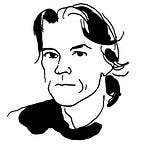Partial Meaningfulness Makes No Sense
If you are a person with a spiritual outlook on life and engage in a conversation about the big questions with someone who has a more materialistic mindset, there is one notion that is particularly difficult to convey: the meaningfulness of life. Not just the good parts, but all of it.
Most people, regardless of their degree of spirituality, will happily acknowledge a sense of meaning and purpose when they fall in love, become parents or have a blissful experience in nature. Most would probably say the same thing about events outside of their own lives that are perceived as clearly positive, like a successful rescue operation or the fall of a dictator.
It is a completely different story with war, violence and abuse. Those negative aspects of this world are generally perceived as completely without meaning. And no wonder! After all, we are having this wild human experience, for which polarity is paramount.
However, in a universe where every soul is eternal and a part of the same all-encompassing consciousness, and on a physical planet where we are temporary visitors and where death, which is not an end but a transition phase, walks with us every second, even the most horrible acts have some sort of meaning, on some level, in some part of the great universal balancing act that is constantly playing out, although it is extremely hard to see that when they happen.
Everybody who has made an attempt to get this message across to someone who doesn’t see life like that knows how almost impossible it is. More often than not, it feels better not to say anything at all, because you know that you will promptly be accused of being callous and judged thereafter. But the accusation stems from a big misunderstanding.
If you see meaning in something that everybody deems bad, it does not mean that you don’t resent it as much or don’t feel as sad about it as everybody else. You may even hate it. But you are less likely to be consumed by fear and despair.
It does not make any sense that some events should be meaningful and others meaningless
Let me try a thought that I think might be helpful in this philosophical tight spot. It is very simple, but I find it powerful.
If there is any purpose at all to this universe — and I believe quite a few agnostic people would be open to that possibility — it does not make any sense that some events should be meaningful and others meaningless.
Think about it: where would the universe draw the line? A breakup with a loved one could be meaningful because, painful as it is, it teaches you a lesson, but the death of a loved one is meaningless because the pain is simply too unbearable? Stumbling over a job opportunity which shows to be the best choice you ever made is clearly meaningful, whereas getting fired may have some meaning because it can lead you to a better path, but losing everything you have in a scam is totally meaningless?
(Of course, it is up to each of us if we want to keep our own personal set of meaningful and meaningless sections within the confines of the earthly lives we are living at the moment. But that is something else. We can do that and still realize there is some higher purpose, even if we will not necessarily understand it in this life.)
Life unfolds seamlessly, with perceived positive outcomes following perceived negative outcomes all the time. We think of them as events, but what is going on is rather a constant confluence of myriad decisions and other influences without any clear delineations.
It is very much like in the parable of the Chinese farmer who says ”maybe” every time his neighbors either pity him when things look bad or congratulate him when things look good.
The universe is not compartmentalized
It would be impossible to make a reasonable division between what has a purpose and what does not. Everything that happens has immensely intricate aspects and angles. The universe is not compartmentalized.
Either everything has meaning or nothing has meaning. Can it be any other way?
The existentialists, at least the hard core, arrived at the latter, morose conclusion. Once there, the most important question becomes why one should continue this life. Jean-Paul Sartre et al solved that dilemma by making the paradoxical claim that complete meaninglessness gives freedom to create meaning.
The absurdists went even further and said we should all rebel against the meaninglessness of having been born. Doesn’t that sound like an … absurd evasion?
I am not a fan of either of those loveless, masculine energy dominated, materialistic philosophies, to put it mildly. They certainly represent possible logical endpoints of not seeing any meaning in existence.
Either everything has meaning or nothing has meaning.
I think this is something to ponder for anyone who struggles with this existential conundrum. It may even work as a koan.
***
If you like this text, please check out my other essays on Medium
I have a podcast and a Youtube channel called Mind the Shift
I also have a website
